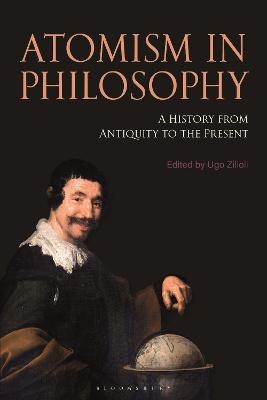
Atomism in Philosophy
Bloomsbury Academic (Verlag)
978-1-350-35505-7 (ISBN)
Focusing on important moments in the history of human thought when the debate about atomism was particularly flourishing and transformative for the scientific and philosophical spirit of the time, this collection covers:
- The discovery of atomism in ancient philosophy
- Ancient non-Western, Arabic and late Medieval thought
- The Renaissance, when along with the re-discovery of ancient thought, atomism became once again an important doctrine to be fully debated
- Logical atomism in early analytic philosophy, with Russell and Wittgenstein
- Atomism in Liberalism and Marxism
- Atomism and the philosophy of time
- Atomism in contemporary metaphysics
- Atomism and the sciences
Featuring 28 chapters by leading and younger scholars, this valuable collection reveals the development of one of philosophy's central doctrines across 2,500 years and within a broad range of philosophical traditions.
Ugo Zilioli is Leverhulme Researcher at the Faculty of Theology and Religion at the University of Oxford and Associate Member of Lady Margaret Hall, UK. He is author of Protagoras and the Challenge of Relativism: Plato's Subtlest Enemy (2007; 2nd edition 2016), The Cyrenaics (2014) and editor of From the Socratics to the Socratic Schools: Classical Ethics, Metaphysics and Epistemology (2015).
List of Contributors
Preface & Acknowledgments
Abbreviations and Transliterations
General Introduction, Ugo Zilioli
PART I. ATOMISM IN ANCIENT PHILOSOPHY
1. Early Ancient Atomism, Similarities and Differences, Andrew Gregory
2. The Reception of Atomism in Ancient Medical Literature: From Hippocrates to Galen, Vincenzo Damiani
3. Why Aren’t Atoms Coloured?, David Sedley
4. Atoms and Minimal “Parts”: The Originality of Epicurean Atomism, Francesco Verde
5. Atoms and Universals in Epicurus, Attila Nemeth
6. Atoms, Complexes and Simples in the Theaetetus, Sophie-Grace Chappell
7. Atomism in Plato’s Timaeus, Luca Pitteloud
PART II. ATOMISM IN NON-WESTERN, MEDIEVAL AND MODERN PHILOSOPHY
8. Atoms and Orientation: Vasubandhu’s Solution To The Problem Of Contact, Amber Carpenter and Ngaserin Ng Jing Ya
9. Aggregates versus Wholes: An Unresolved Debate between the Ny¯aya-Vai´ses.ika and Buddhist Schools in Ancient Indian Atomism, Sahotra Sarkar
10. Atomism and Islamic Thought, Francesco Omar Zamboni
11. Atoms and Time I, Charles Doyle
12. Atoms and Music in Late Medieval Philosophy, Philippa Ovenden
13. Atomism and the Cambridge Platonists, Adrian Mihai
14. Atomism and Society in William Petty, Akos Sivado
15. Atoms, Colours, and God in Leibniz, Alberto Artosi
PART III. ATOMISM IN CONTEMPORARY THOUGHT
Section I: Philosophy
16. Logical Atomism and Wittgenstein, Annalisa Coliva
17. Atomism and Semantics in the Philosophy of Jerrold Katz, Keith Begley
18. Atoms and Knowledge, Nick Treanor
19. Atoms and Time II, Mauro Dorato
20. Atomism and Marxism in Louis Althusser, Panagiotis Sotiris
21. Atomism and Liberalism, Philip Krinks
Section II: Metaphysics
22. Atoms as Universals, Matthew Tugby
23. Atoms and Extended Simples, Travis Dumsday
24. Power Gunk, or Unlimitedly Divided Powers, Anna Marmodoro and Andrea Roselli
25. Atoms and Tropes, Peter Simons
Section III: The Sciences: Physics and Chemistry
26. Atoms and Physics-Based Structuralism, Matteo Morganti
27. Atoms and Chemistry I: Not a Success Story, Paul Needham
28. Atoms and Chemistry II, Robin Hendry
Index
| Erscheinungsdatum | 30.05.2022 |
|---|---|
| Verlagsort | London |
| Sprache | englisch |
| Maße | 156 x 234 mm |
| Themenwelt | Geisteswissenschaften ► Philosophie ► Erkenntnistheorie / Wissenschaftstheorie |
| Naturwissenschaften | |
| ISBN-10 | 1-350-35505-4 / 1350355054 |
| ISBN-13 | 978-1-350-35505-7 / 9781350355057 |
| Zustand | Neuware |
| Haben Sie eine Frage zum Produkt? |
aus dem Bereich


![Was heißt Denken?. Vorlesung Wintersemester 1951/52. [Was bedeutet das alles?] - Martin Heidegger](/media/113619842)